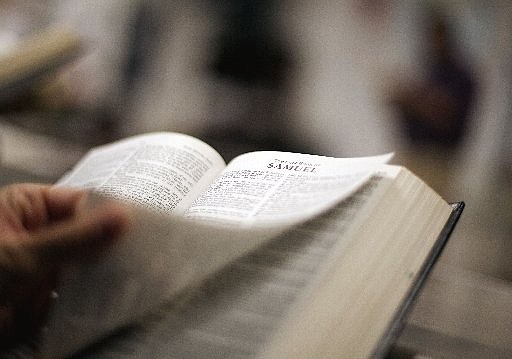NASHVILLE - Some Tennessee House members who voted yes last year on a bill making the Holy Bible Tennessee government's official book are hesitating about joining efforts to override Republican Gov. Bill Haslam's veto of the measure.
Haslam's veto message was read Monday night to the House and, as expected, Rep. Jerry Sexton, R-Bean Station, the bill's sponsor, filed a notice he planned to attempt an override on Wednesday.
If successful there and in the Senate, it would be the first time the GOP-controlled General Assembly would have overridden Haslam, whose previous three vetoes came after lawmakers had adjourned their annual session and left town.
Overriding a Tennessee governor's veto is relatively easy. All it takes is the same number of votes constitutionally required to pass a bill - 50 of the 99-member chamber. The Bible bill passed the House last year with 55 votes.
But while overriding a veto is easy in theory, it's not often done.
"I wouldn't vote to override the governor," said Rep. David Shepard, D-Dickson, who voted for the bill last year and isn't seeking re-election. "I trust what he's doing. He's obviously put a lot of thought in this."
Senators passed the measure this year with 19 votes in the 33-member chamber.
In his veto message to the House, Haslam wrote that "my personal feeling is that this bill trivializes the Bible, which I believe is a sacred text. If we believe that the Bible is the inspired word of God, then we shouldn't be recognizing it only as a book of historical and economic significance."
The governor also says if the state is "recognizing the Bible as a sacred text, then we are violating the Constitution of the United States and the Constitution of the State of Tennessee by designating it as the official state book."
Tennessee Attorney General Herbert Slatery recently issued a legal opinion saying the measure in his view violates both the Tennessee and U.S. Constitutions.
Shepard said Rep. Johnny Shaw, D-Bolivar, an ordained minister, has told him he also plans not to support overriding Haslam.
Asked where he is on overrriding Haslam, Rep. Steve McDaniel, R-Powells Crossroads, the deputy House speaker, said, "I'm studying about it. I'm thinking about it. I voted for it and I'm thinking about it. It always has an impact when a governor vetoes" a bill.
Rep. William Lamberth, R-Portland, an attorney, who also voted for the bill last year, said he too is re-evaluating the measure in light of Haslam's veto.
"It's not really about whether the Bible can be a state book, it's whether I want to vote to override the governor's veto on this issue."
He noted that last year the House failed to adopt an amendment that would have made President Andrew Jackson's personal Bible the state's official book. It failed.
"I feel that would have been a very, very good way to resolve this from a constitutional standpoint," Lamberth said, noting that "to just make the amorphous Bible the state book is problematic from a constitutional standpoint. There's no doubt about it."
Sexton, a former Baptist minister, refused to discuss the veto override or the hesitations by some colleagues with a reporter. If he fails to get continued support from just six colleagues - they wouldn't have to vote no and could simply abstain - the attempted override would fail to meet the required 50 votes.
The effort could be easier in the Senate where just three of the 19 senators who voted yes could decide not to support the override and scuttle the effort. A bill needs 17 votes to succeed there.
But the preacher-turn-businessman was clearly nervous on the House floor, fearing treachery from senators down the hall.
"It's my understanding the Senate may close and not hear it," Sexton told the chamber.
He wanted to know how many votes it would take to suspend or change House rules. The answer is 66 of the 99 members. After evidently gaining some assurance in a hast1ily called, off-microphone consultation with House Speaker Beth Harwell, R-Nashville, and House Clerk Joe McCord, he dropped the issue.

